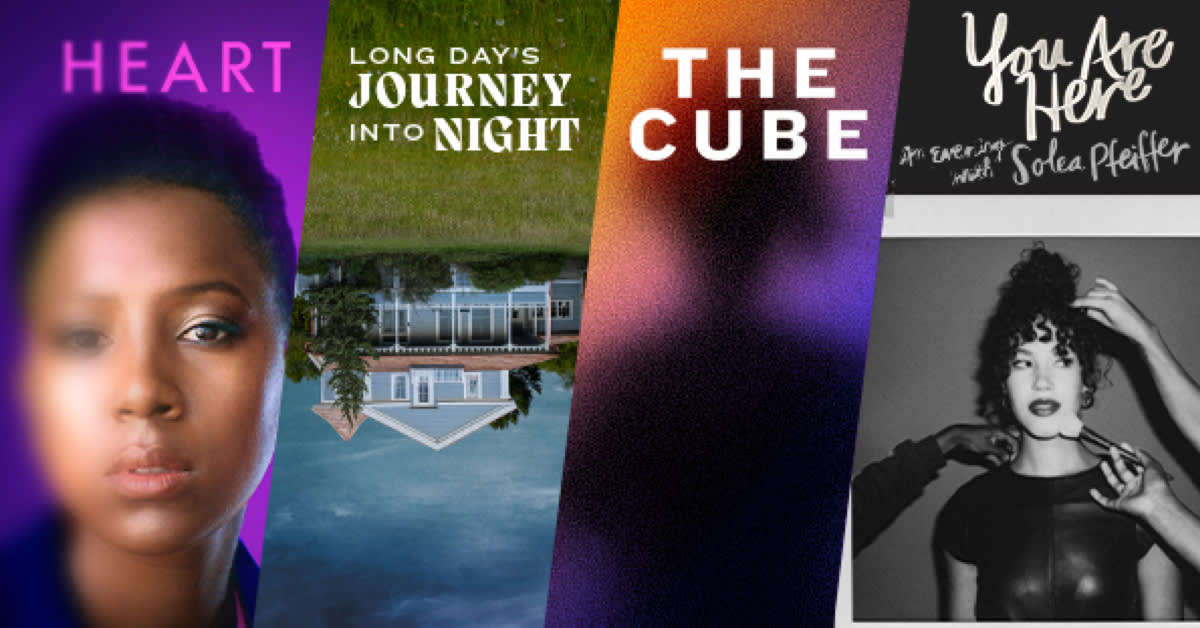Major stars headline the summer lineup from Audible Theater. Between Bill Camp, Elizabeth Marvel, Ato Blankson-Wood, Solea Pfeiffer, and Adam Rapp, the diverse voices and varied productions offer a wide range of theater-going experiences. Check out our reviews of the slate below, as well as everything Audible Theater has to offer here.
Save this list to your Library Collections now.
You Are Here by Solea Pfeiffer
You haven’t heard poignant until you’ve heard Solea Pfeiffer as she elegantly and passionately sings her soul out. With all of her natural-born talents as a singer and performer (West Side Story, Hamilton, Light in the Piazza, Evita, the list goes on and on) she still has to define herself to others, and the curiosity has nothing to do with her talents. She shares with the audience what life is like for a biracial woman. Pfeiffer is constantly asked, “What are you?” Her features are analyzed; race in America lets her know that her light skin gives her safety that her darker siblings don’t have. In answer to the question, “Where do you come from?” she deftly responds, “I come from everywhere I’ve ever been.” It makes you want to yell at the world, “Leave her alone!” For the record, Pfeiffer was born in Zimbabwe, her mother is African American, her father is white, both are anthropologists. They gave Solea the freedom to do whatever she wants, as long as she does her best. In this performance she goes beyond, and her band is behind her and by her side all the way.
During her performance, Minetta Lane’s walls must’ve been talking their heads off. When she sang Stevie Wonder’s “My Cherie Amour” it became all hers—no disrespect to Wonder. The same for “You’re Gonna Hear from Me.” She’s also an engaging storyteller generously sprinkling in humor and wit with precision throughout her performance.
When Black people weigh in on or compliment a singer they like a whole lot, we don’t say, “That girl sure can sing.” We say, “That girl, can sang.” You got this, Solea. You sure can sang. —Yvonne D.
Heart by Jade Anouka
Heart
Listening to Jade Anouka’s poetic and semi-autobiographical performance of her debut play, Heart (directed by Ola Ince), was a challenging but rewarding emotional experience. As a self-professed “misfit” (the target audience for this Audible Original theater performance), I was immediately drawn to Anouka’s story. I groaned during her early refrains of “We are handsome... and people like us!” as she struggled to convince herself that staying in her toxic marriage was a good idea. I clapped when she chose to leave her husband and found that—surprise, surprise—the “perfect life” she was building wasn’t all that perfect for her. I winced when her father chided her for moving back home at 28...and that was just the first half.
In the second half of the play, Anouka heals from her divorce by going on both a literal and metaphorical journey toward self-discovery. When she least expects it, she finds true love with a woman (woohoo!)—much to the chagrin of her religious parents (ugh). Perhaps an even higher hurdle than her unsupportive parents is her internalized biphobia. In one particularly poignant scene, Anouka’s fear (which she refers to as “her beast”) agonizingly argues against her same-sex relationship: “This is the life we live in! This is society! So many people think it’s wrong! Hell, I grew up thinking that straight was the only way!” Ultimately, Anouka is forced to make the choice us misfits know all too well: truth and self-acceptance, or lies and external approval? (Note to self: Figure out how to send this play to my therapist.)
While Heart is just over an hour long (I listened in one sitting), it recounts a half-decade of personal growth. Punctuated by incredible original music composed and performed by Ivor Novello Award–winner Renell Shaw, Anouka’s performance was raw and even intimidating at times. Yet, behind each vulnerable line and reverberant musical score is an invitation to the audience to look inward and ask: Who would I be without judgment? At the end of the play, Anouka pleads with the audience to accept her—to accept “others.” It is at this moment that the audience becomes members of society—as opposed to the misfits who were summoned at the start. I was left with the understanding that, paradoxically, much like Anouka, each of us occupies both sides of this duality: other and member. Outcast and oppressor. Misfit and conformer. While I don’t feel closer to answering how we can change the less accepting parts of society, I am comforted to know I can choose to ignore them—at least sometimes. —Rachael X.
The Cube by Adam Rapp
"Sometimes to change your life, you have to perform an unthinkable act." That line, spoken in the second act of Adam Rapp's The Cube, in many ways sums up the premise of his dark and complicated investigation into why actors continue to undergo traumatic moments repeatedly for the pleasure of audiences. Do we require surrogates to perform those acts so we can vicariously feel like we've survived them ourselves without having to suffer? It's a question I've pondered over the years as I've sat in dark spaces and passively witnessed violence and pain, joy and anguish, and then wrestled with the lessons I've hopefully gleaned, relishing the catharsis I've (sometimes) experienced. Rapp—a successful playwright whose chilling work translates well to audio—clearly understands his own complicity in this symbiotic game, and he is relentless in his critique of the privileged class of observers who both support and pay for the artistic enterprise while also extracting emotional surplus value.
In the first act of The Cube, a bored, rich, white woman (played by Carla Gugino) is invited to a mysterious night of radical theater for which she pays $1,000—no questions asked. The spectacle she experiences is graphic and visceral and leaves her forever changed since she can't quite shake the feeling that this production was undeniably more "fact" than "fiction." But it's the second act that truly drives home the stakes of engaging in this ritual. We hear from a Juilliard-trained, biracial Black actor (Juliana Canfield) whose career was just taking off when the pandemic shut down all her opportunities until she was cast in a provocative "special performance." First, she describes the daily immolation of performing her breakout role, in a production of Caryl Churchill's feminist play Top Girls. "[I]t felt like I was leaving a piece of me on the stage; the smallest, softest sliver of tissue. During the run of the play, I’d often go to bed with an ache where it felt like hunks of my guts were missing. And I’ll never get those parts of me back, but it was worth it." Yet, she notes that each night, hundreds of white faces stare back. "Were they truly admiring the work or were they applauding themselves for being so progressive?" It's a constant battle that she, as a woman of color, endures as she's subjected to racist criticism and micro aggressions while striving to be validated for doing the thing that she loves.
By the end of this indictment of theater's ridiculousness, I was in a quandary. Yes, live theater does have the power to transform, yet as audience members we often feel like we have the right to take whatever we perceive is being offered, rarely able to discern what may have been irrevocably sacrificed for our momentary benefit. Rapp offers no easy answers. —Jerry P.
Long Day's Journey Into Night by Eugene O'Neill
Long Day's Journey into Night
By Eugene O'Neill
Narrated by Bill Camp, Elizabeth Marvel, Ato Blankson-Wood, Jason Bowen
English student confession time: I had never seen Eugene O'Neill's masterpiece until its recent limited run at the Minetta Lane Theatre, and honestly I think I found this production more accessible than I would have found the original. Abridged to around two hours (down from its original four), this revival, helmed by Tony-nominated director Robert O'Hara's (Slave Play), imagined the claustrophobic classic set against the backdrop of the early days of the pandemic lockdown. It opens with a family of four seemingly enjoying each other's company, delighted to chat, laugh, and even sing together. The thought definitely crosses your mind like a Rae Dunn inspirational message: There's a lot of love here (#blessed). Of course, as fans of the work know, this notion is quickly upended and complicated as the realization dawns—among both the audience and among the cast—that there are several tragedies afoot, with each character mired in a different stage of grief.
With clever set design (including discarded masks, a yoga mat, stacks of Amazon boxes, and news clips featuring President Donald Trump and Dr. Anthony Fauci), an air of restlessness and bewilderment—so familiar to anyone who lived through lockdown—mixes with the addiction, hopelessness, and booze that already permeates the script to set a scene that was as familiar as it was anxiety-inducing. I walked out of the theater feeling as drunk as the characters on stage. Intending to go for a drink after the show with a friend, we both looked at each other and instead decided to take the advice you feel compelled to shout at the stage toward the end: "Just go to bed already!" But as much as I was blown away by the performance, I was uncertain if the contemporary setting would truly show up without the visual aspect of stagecraft.
I needn't have worried. As it turns out, O'Neill's dialogue is ageless in the hands of this terrifically talented cast. Elizabeth Marvel as Mary brings an intentional foolishness to the role—the attempt to distract from her drug use a ploy as old as time. Ato Blankson-Wood as Edmund brings the poetic angst of youth, only tempered by the very real rub up against mortality. The sound design works overtime: the soft cork pop of a bottle, the rush of relief each time Mary slips away to use, the hint of seagulls. All of these elements immerse you in the story. And ultimately it turns out that you bring the setting; as someone who recently lived through lockdown, your lived experience shows up to inform you of what's happening. It's a really interesting dynamic. The smart editing by O'Hara tells the story in a way that gets more quickly to the heart of it. Purists may be displeased, but I found the essence of O'Neill's work as distilled and portable as one of James Tyrone's many glasses of whiskey. —Emily C.








